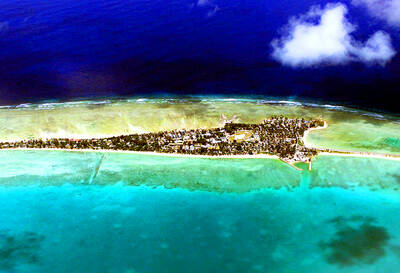Four men being held as terror suspects at a US military base in Afghanistan are asking a federal judge for the right to sue for their release — a right already given to detainees at Guantanamo Bay.
A hearing yesterday was to test whether a Supreme Court decision last year allowing al-Qaeda and Taliban suspects at the US naval base in Cuba to challenge their detention should be extended to detainees held at other military prisons overseas.
The government argues that the detainees should have their cases heard by military tribunals.
“This court has no jurisdiction to review this,” the Justice Department wrote in a Dec. 19 motion asking for the case to be dismissed.
It added: “Federal courts should not thrust themselves into the extraordinary role of reviewing the military’s conduct of active hostilities overseas, second-guessing the military’s determination as to which captured aliens as part of such hostilities should be detained, and in practical effect, superintending the executive’s conduct in waging a war.”
But lawyers for the four men in yesterday’s case in US District Court say the Guantanamo standard needs to be applied to other prisons.
Otherwise, “a lot of the Guantanamo detainees could be transferred to Afghanistan — basically shifting the problem somewhere the government argues that they cannot challenge,” said Kathleen Kelley of the International Human Rights Clinic at Stanford Law School, who is representing three of the four men.
“We are saying that’s just not true,” Kelley said on Tuesday. “Detainees cannot be held without process indefinitely anywhere by the US government.”
More than 200 detainees are challenging their imprisonment at Guantanamo, where many have been held for years without being charged with a crime.
But more than 600 are being held at Bagram Air Base outside of Kabul, Afghanistan’s capital. In Iraq, officials estimate thousands are imprisoned in US-maintained detention centers.
The evidence against the four men at the heart of yesterday’s case is unknown, and many facts about how and whether they were initially swept up and imprisoned after the attacks of Sept. 11, 2001, have never been made clear. Their lawyers are largely relying on statements from the International Committee of the Red Cross and other detainees who have since been released to build their case for freedom.
Tina Foster of the International Justice Network said none of the four — two Yemeni, one Tunisian and one Afghan — were in Afghanistan at the time they were captured in 2002. At least two of them disappeared for several years, then turned up in Bagram, Foster said.

DISASTER: The Bangladesh Meteorological Department recorded a magnitude 5.7 and tremors reached as far as Kolkata, India, more than 300km away from the epicenter A powerful earthquake struck Bangladesh yesterday outside the crowded capital, Dhaka, killing at least five people and injuring about a hundred, the government said. The magnitude 5.5 quake struck at 10:38am near Narsingdi, Bangladesh, about 33km from Dhaka, the US Geological Survey (USGS) said. The earthquake sparked fear and chaos with many in the Muslim-majority nation of 170 million people at home on their day off. AFP reporters in Dhaka said they saw people weeping in the streets while others appeared shocked. Bangladesh Interim Leader Muhammad Yunus expressed his “deep shock and sorrow over the news of casualties in various districts.” At least five people,

ON THE LAM: The Brazilian Supreme Court said that the former president tried to burn his ankle monitor off as part of an attempt to orchestrate his escape from Brazil Former Brazilian president Jair Bolsonaro — under house arrest while he appeals a conviction for a foiled coup attempt — was taken into custody on Saturday after the Brazilian Supreme Court deemed him a high flight risk. The court said the far-right firebrand — who was sentenced to 27 years in prison over a scheme to stop Brazilian President Luiz Inacio Lula da Silva from taking office after the 2022 elections — had attempted to disable his ankle monitor to flee. Supreme Court judge Alexandre de Moraes said Bolsonaro’s detention was a preventive measure as final appeals play out. In a video made

It is one of the world’s most famous unsolved codes whose answer could sell for a fortune — but two US friends say they have already found the secret hidden by Kryptos. The S-shaped copper sculpture has baffled cryptography enthusiasts since its 1990 installation on the grounds of the CIA headquarters in Virginia, with three of its four messages deciphered so far. Yet K4, the final passage, has kept codebreakers scratching their heads. Sculptor Jim Sanborn, 80, has been so overwhelmed by guesses that he started charging US$50 for each response. Sanborn in August announced he would auction the 97-character solution to K4

SHOW OF FORCE: The US has held nine multilateral drills near Guam in the past four months, which Australia said was important to deter coercion in the region Five Chinese research vessels, including ships used for space and missile tracking and underwater mapping, were active in the northwest Pacific last month, as the US stepped up military exercises, data compiled by a Guam-based group shows. Rapid militarization in the northern Pacific gets insufficient attention, the Pacific Center for Island Security said, adding that it makes island populations a potential target in any great-power conflict. “If you look at the number of US and bilateral and multilateral exercises, there is a lot of activity,” Leland Bettis, the director of the group that seeks to flag regional security risks, said in an